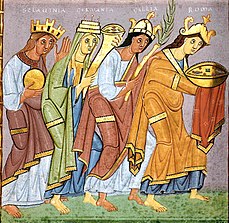
Back ليشيتيس ARZ Lequites Catalan Lechité Czech Лєхѧнє CU Λεχίτες Greek Lechites English Lechitas Spanish قوم له Persian Lechiti Italian 레흐족 Korean

Suku Lechia (bahasa Polandia: Lechici)[1] – sebuah kelompok suku dan bahasa dari Slavia Barat, nenek moyang modern Pole dan sejarah Pomerania dan Polabia.[2][3] Secara historis, istilah Wend (Latin: Venedi, Venedae) mirip di dalam arti, meskipun kadang hanya disebut Slavia Barat di antara Kekaisaran Romawi Suci. Namun, Mieszko I, pemimpin historis pertama Polandia, juga muncul "sebagai Dagome, Raja Wend" (Norwegia Kuno: Vindakonungr).
- ^ Tadeusz Lehr-Spławiński. Język polski. 1978
- ^ "Laesir is the Old Norse term for the Ljachar, a people near the Vistula in Poland". [in:] Theodore Murdock Andersson, Kari Ellen Gade Morkinskinna: The Earliest Icelandic Chronicle of the Norwegian Kings (1030–1157). ISBN13 9780801436949 p. 471; "The word here for Poles is "Laesum" – the dative plural from a nominative plural "Laesir". This clearly is derived from the old name for Pole – "Lyakh", since in the course of the Slavonic paradigm -kh- becomes -s-in accordance with the "second palatalization" and the addition of the regular Norse plural ending of -ir- [...] [in:] The Ukrainian review. 1963. p. 70; "eastern Wends, meaning obviously the Vjatyci/Radimici, Laesir "Poles" or "Western Slavs" (ef. Old Rus'ian ljaxy) [in:] Omeljan Pritsak. Old Scandinavian sources other than the sagas. 1981. p. 300
- ^ "Vandalis, Gothis, Longobardis, Rugis et Gepidis, quos vacant aliqui Cimbros, quos hodie vocamus Pomeranos" [in:] Jan Długosz. Annales seu cronicae incliti Regni Poloniae. t. I., p. 35